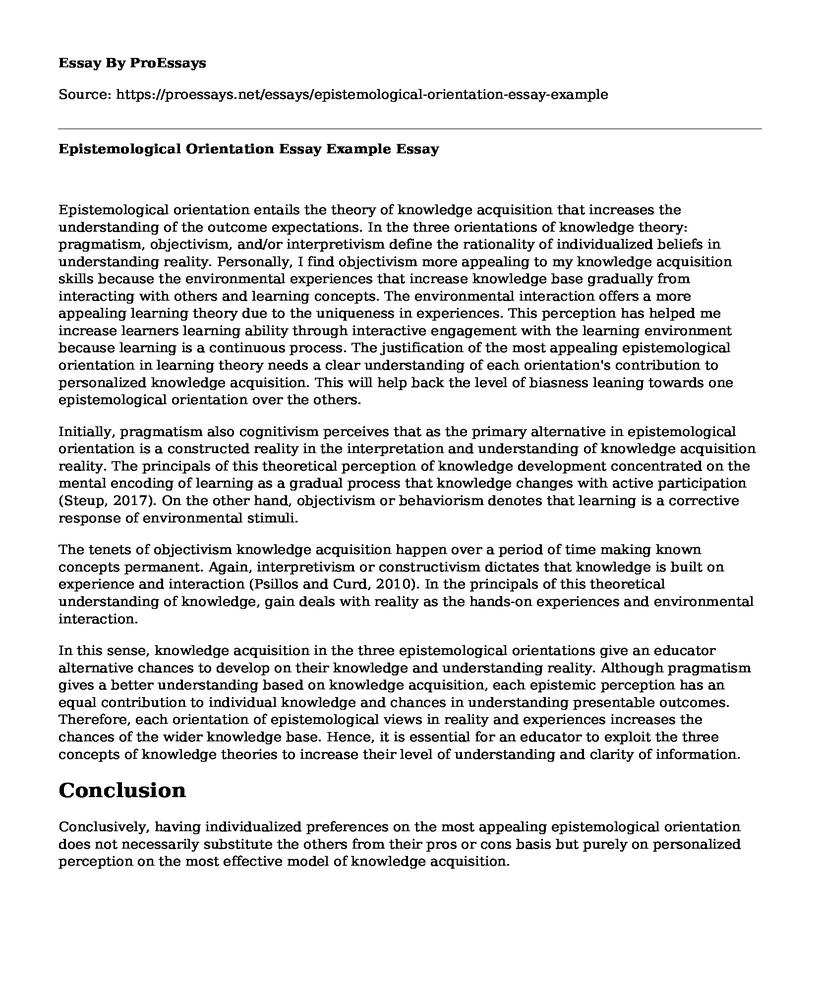Epistemological orientation entails the theory of knowledge acquisition that increases the understanding of the outcome expectations. In the three orientations of knowledge theory: pragmatism, objectivism, and/or interpretivism define the rationality of individualized beliefs in understanding reality. Personally, I find objectivism more appealing to my knowledge acquisition skills because the environmental experiences that increase knowledge base gradually from interacting with others and learning concepts. The environmental interaction offers a more appealing learning theory due to the uniqueness in experiences. This perception has helped me increase learners learning ability through interactive engagement with the learning environment because learning is a continuous process. The justification of the most appealing epistemological orientation in learning theory needs a clear understanding of each orientation's contribution to personalized knowledge acquisition. This will help back the level of biasness leaning towards one epistemological orientation over the others.
Initially, pragmatism also cognitivism perceives that as the primary alternative in epistemological orientation is a constructed reality in the interpretation and understanding of knowledge acquisition reality. The principals of this theoretical perception of knowledge development concentrated on the mental encoding of learning as a gradual process that knowledge changes with active participation (Steup, 2017). On the other hand, objectivism or behaviorism denotes that learning is a corrective response of environmental stimuli.
The tenets of objectivism knowledge acquisition happen over a period of time making known concepts permanent. Again, interpretivism or constructivism dictates that knowledge is built on experience and interaction (Psillos and Curd, 2010). In the principals of this theoretical understanding of knowledge, gain deals with reality as the hands-on experiences and environmental interaction.
In this sense, knowledge acquisition in the three epistemological orientations give an educator alternative chances to develop on their knowledge and understanding reality. Although pragmatism gives a better understanding based on knowledge acquisition, each epistemic perception has an equal contribution to individual knowledge and chances in understanding presentable outcomes. Therefore, each orientation of epistemological views in reality and experiences increases the chances of the wider knowledge base. Hence, it is essential for an educator to exploit the three concepts of knowledge theories to increase their level of understanding and clarity of information.
Conclusion
Conclusively, having individualized preferences on the most appealing epistemological orientation does not necessarily substitute the others from their pros or cons basis but purely on personalized perception on the most effective model of knowledge acquisition.
References
Psillos, Stathis; Curd, Martin (2010). The Routledge companion to philosophy of science. London: Routledge. pp. 129-138.
Steup, Matthias (8 September 2017). Zalta, Edward N., ed. The Stanford Encyclopedia of Philosophy. Metaphysics Research Lab, Stanford University - via Stanford Encyclopedia of Philosophy. Available at https://plato.stanford.edu/entries/epistemology/
Cite this page
Epistemological Orientation Essay Example. (2022, Nov 07). Retrieved from https://proessays.net/essays/epistemological-orientation-essay-example
If you are the original author of this essay and no longer wish to have it published on the ProEssays website, please click below to request its removal:
- Impact of the Atmospheric Carbon (IV) Oxide on Forest Ecosystems
- Essay on Employment Law in the Twenty-First Century
- The Matrix Between Descartes and Plato Questions and Answers
- Critical Response to Plato's Gorgias and Phaedrus Paper Example
- Ethics of Duty: Deontology & Immanuel Kant - Essay Sample
- Singer vs O'Neill on World Famine Relief: Kantian Viewpoints - Essay Sample
- Free Report Example on Striking Effect







